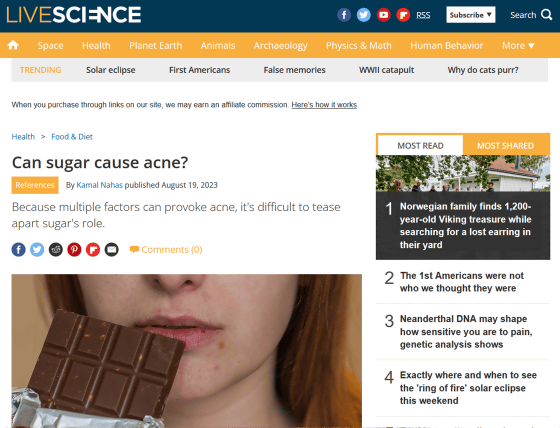Does sugar cause acne?

The theory that ``eating too much sweets increases acne'' is widely whispered, and some people may have actually experienced improvement in their acne by cutting back on sweets. However, it seems that the relationship between sugar and acne is not that simple, and Live Science, a scientific media, explains whether cutting back on sugar is actually effective in fighting acne.
Can sugar cause acne? | Live Science

Many people have probably refrained from eating sweets in hopes of getting rid of acne, but acne can be caused by a variety of factors, including hormone levels, sebaceous glands , skin cell aggregation, skin microbiota (yes), stress, and diet. It occurs due to the interaction of factors. Therefore, just because a person avoids sugar intake does not necessarily mean that their acne will improve.
'Dietary changes alone are generally not recommended as the sole treatment for acne patients, ' Tanya Greiwal , a dermatologist at the University of Washington, said in an email to Live Science. You may also need oral medication.'
However, studies conducted in countries such as China , France , and Turkey have confirmed that there is a correlation between sugar intake and acne. However, these are only observational studies and do not show a causal relationship that ``sugar intake causes acne,'' so other factors may be at play.

Live Science points out that ``many acne studies have flaws in experimental design and results are difficult to interpret, making it difficult to draw definitive conclusions.'' For example, even if a subject self-reports that they have acne, there is a possibility that it could be something else similar in appearance to acne, such as
Also, in studies that have investigated the correlation between diet and acne, what they ate mainly depends on the subjects' self-reports. However, Anjali Mahto, a spokesperson for the British Association of Dermatologists, said: 'People are not very good at accurately recording the type and amount of food they eat,' adding that surveys that rely on self-reporting It is said that there are limits.
Because studies tend to be conducted only over a specific time period, it is difficult to know the relationship between long-term changes in dietary patterns and acne improvement. Additionally, sweet foods often contain other ingredients that can affect acne, such as dairy and cocoa , making it difficult to determine if sugar is really the culprit, says Live. Science points out.

Despite this, people tend to adopt the option of abstaining from sweets to treat acne. As for the reason for this, Mahto said, ``People want to do things that they can do and control,'' and believes that changing their eating habits is relatively easy to implement.
Another factor other than sugar that can trigger acne is the accumulation of the stress hormone
Additionally, male hormones such as testosterone and its byproduct dihydrotestosterone are major triggers of acne in both men and women. These hormones are said to increase the secretion of sebum, making pores more likely to become clogged and, as a result, creating conditions in which acne-causing bacteria , the cause of acne, can easily breed.
According to Live Science, high-GI foods and sweets that cause a sudden rise in blood sugar levels trigger an insulin response, which increases the secretion of insulin-like growth factor (IGF-1), which promotes the production of male hormones. . Therefore, it can be theoretically believed that eating high GI foods and sweets stimulates the secretion of male hormones, making it easier to develop acne.

Consuming dietary fiber at the same time is effective in suppressing the insulin response, so eating sugar together with dietary fiber may reduce the risk of acne. However, because there are so many factors related to acne, Live Science says that although it is certainly possible to think that ``sugar intake is one of the causes of acne,'' it is difficult to compare it with other factors. .
Mahto points out that acne patients often change their diet on their own rather than consulting a dermatologist for treatment, but there are concerns that they restrict their diet to the point of nutritional deficiencies. 'Eating well for your skin is just like eating well for other organs in your body,' he said, concluding that you shouldn't overly restrict your diet.
Related Posts:







